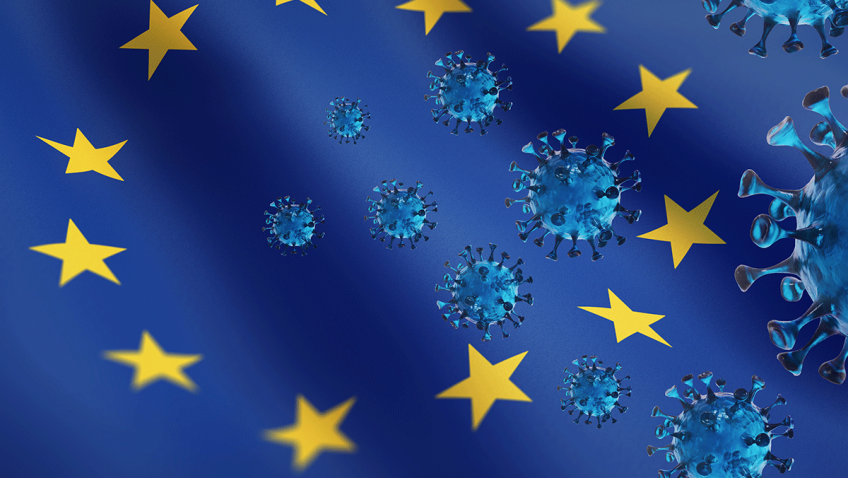Recent crises of the European Union — most notably the financial crisis, post-2008, and the migration crisis — strained EU solidarity to a point from which it has not recovered. Faced with the current crisis, precipitated by COVID-19, it is unclear whether European cooperation will be able to withstand the additional tension.
Rise in bottom-up discontent:
In the midst of a global crisis of unprecedented scale, and faced with a long and complex road to recovery, European solidarity is currently more tested and necessary than ever before. However, the lack of a single ‘national’ European consciousness is accelerating discord within the already fragile union. In Italy, stark imagery of people burning the EU flag in a demonstration of discontent is symbolic of the effect this crisis is having and will have, on this tenuous union. Despite an EU procurement scheme which provided 1.5 billion euros of PPE across 25 member states as well as the sharing of ICU facilities and vital medical supplies, polling suggests that 88% of Italians feel that Europe is failing to support Italy in the crisis, with 67% of Italians considering EU membership a disadvantage. The procurement scheme has now been rolled out, but its delayed creation and implementation meant that the EU lost vital ground in the global narrative to China and Russia, who provided supplies for some of the hardest-hit countries. The Union suffered popular discontent in previous crises. However, the polling data from Italy suggests that it is different this time around, as Euroscepticism grows amongst previously supportive middle-class Italian liberals. Post-Covid, it is likely that Euroscepticism will not remain at the periphery, adding further strain to the band of EU cooperation.
Economic Fallout:
Economic forecasting from the European Commission predicts that the imminent recession will be greater than that post-2008, with income in 2020 expected to fall by 10% resulting in an average budget deficit of 11% across the eurozone. The economic response to the impending post-COVID financial crash encapsulates the discord within the EU. Initially, a €540 billion relief fund primarily centred around the ESM was proposed. First provided in response to the financial crisis it is a proven failure in providing long term stability, evident in the lacklustre Greek economy. The stringent austerity measures attached to the loans have impeded economic recovery and led to an immediate growth in Euroscepticism within the worst affected countries; a situation that the Union knows it could not afford to repeat.
The tightrope that EU leaders at the core of decision making have to walk torn between a large enough fiscal stimulus with a radical reform in the form of Eurobonds and finding an agreement deemed acceptable to all member states has resulted in an economic response that will ultimately disentangle EU integration. The 750 billion package announced is the first time debt has been mutalised across the eurozone however although the common debt suggests unity the terms are evidence of the contrary. Throughout negotiations, the frugal four, a fault line established post-2008, have doggedly opposed common debt resulting in a thrashed out deal that falls below the required mark. Simply the package is not large enough to borrow the phrase from economist Yanis Varoufakis to is ‘macroeconomically puny’. Whilst the sum seems large the way the grants are formed means that for example, Italy will receive net 0.6% GDP set against the impending gloom of austerity at around 9% not dissimilar to levels seen in Greece post-2009. Furthermore, the fact that the sums for each country have been cemented prior to the economic fallout is the gravest mistake; the full effects are yet to be known but the EU’s measure lacks the fluidity to effectively deal with the crisis.
The current crisis renewed the calls for change to future proof the eurozone and strengthen cooperation however this will not be achieved. The measures imposed will over the course of the next five years see an incomparable rise in Euroscepticism across members who suffer as a result of being shackled to the eurozone.
Constitutional challenge:
The landmark case from the German Constitutional Court, which ruled that the EU’s top judges failed to properly scrutinise the bond-buying programme and have asked for the ECB to show proportionality within its quantitative easing programme, undermining the ECJ’s superiority. The decision suggests that the Bundastag and the Federal Government have an obligation to ensure integration measures are based on what the German citizens agreed, thus opening up a Pandora’s box on the central question of sovereignty. Although the ECJ have attempted to reassert primacy with a stark statement denouncing the German ruling, it demonstrates the animosity to greater and deeper cooperation within the strongest of the EU powers.
The Covid-19 pandemic is the third major crisis the EU has experienced in a twelve-year period. The first two crises accentuated areas of discord within the Union. Past crises were not adequately resolved and the band of cooperation never fully rebounded. The current crisis poses the single greatest threat on all three areas of discord and therefore will stretch European cooperation to its limits.


